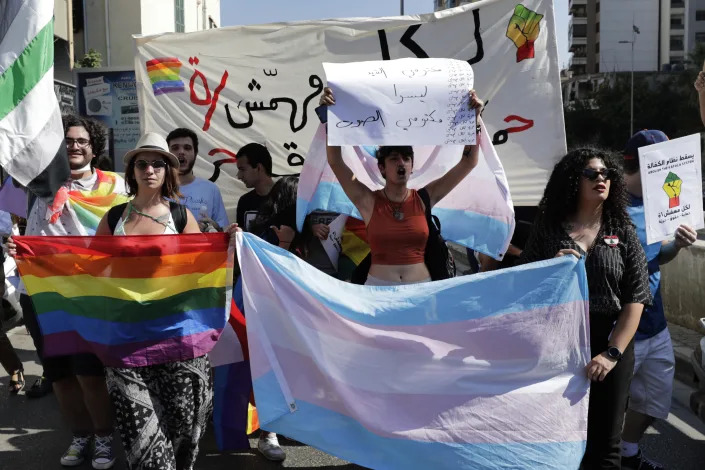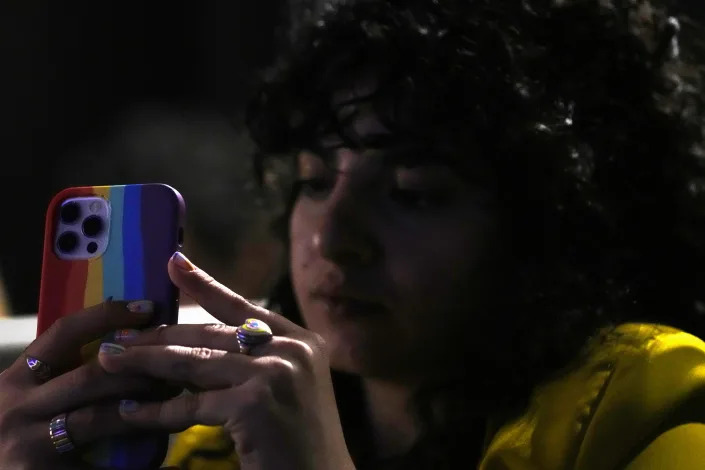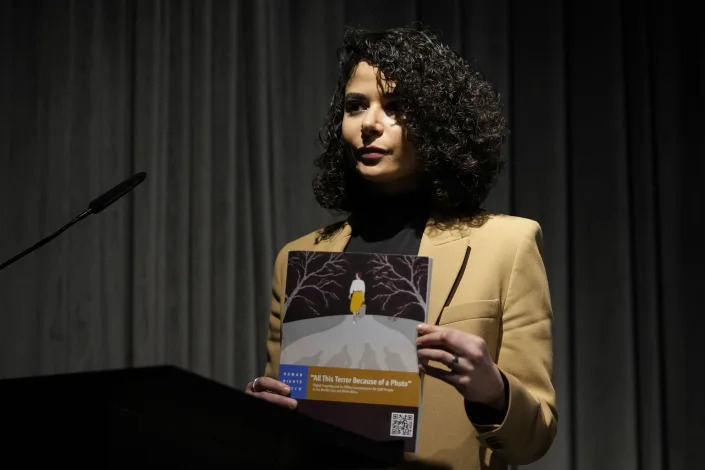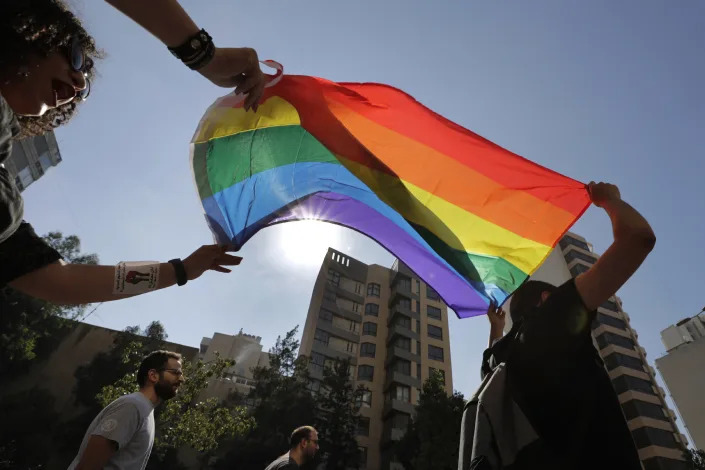Rights group: Mideast governments target LGBTQ people online






Lebanon Egypt Iraq LGBTQFILE -






Lebanon Egypt Iraq LGBTQFILE -
Activists from the Lesbian, Gay, Bisexual, and Transgender (LGBTQ) community in Lebanon shout slogans and hold up a rainbow flags as they march calling on the government for more rights in the country gripped by economic and financial crisis during ongoing protests, in Beirut, Lebanon, June 27, 2020. Security agencies and government officials across several countries in the Middle East and North Africa have been using social media platforms and mobile dating apps to track and crack down on LGBTQ people, international rights group Human Rights Watch said Tuesday, Feb. 21, 2023.
(AP Photo/Hassan Ammar, File)
KAREEM CHEHAYEB
Tue, February 21, 2023
BEIRUT (AP) — Security agencies and government officials in several countries in the Middle East and North Africa have been using social media platforms and mobile dating apps to crack down on LGBTQ people, a rights group said Tuesday.
The findings of a new report by Human Rights Watch exposed digital methods of clamping down on the LGBTQ community in the region. For years the community has relied on online platforms for safety and privacy to sidestep oppression and discrimination due to social stigma and laws that criminalize their expression.
The report, “'All This Terror Because of a Photo': Digital Targeting and Its Offline Consequences for LGBT People in the Middle East and North Africa," documents dozens of cases of security agencies in Egypt, Jordan, Lebanon, Iraq and Tunisia extorting, harassing, publicly outing, and detaining LGBTQ people based on their activities on Facebook and Instagram, as well as queer dating app Grindr. The publication also questions major tech companies for not investing sufficiently in Arabic language content moderation and protection.
“This type of social media frenzy really had implications on people’s lives,” Rasha Younes, senior researcher with the LGBT Rights Program at HRW, said at the press conference.
One case the report documents is a 27-year-old gay man from Egypt named Yazid who said he was arrested and beaten in prison until he would sign papers that said he was “practicing debauchery” and publicly outing himself. He said one of the officers was someone impersonating a gay man who he met on Grindr. Human Rights Watch documented several cases of ill-treatment and sexual assault among other detainees.
In some cases, private individuals and gangs were involved in the extortion. In Lebanon, some people who were extorted online told HRW that they were threatened with being outed to their families and the authorities if they did not pay them a certain amount of money.
Younes added that many of the victims lost their jobs, faced violence and deleted their online accounts, while some opted to leave the country. Many of the victims say they suffered depression, anxiety and distress, while some reportedly attempted suicide.
Mohamad Najem, executive director of the Beirut-based digital rights organization SMEX, accused tech companies of a lack of transparency on their content moderation process. Content moderation is when a company monitors what is published on their platforms to ensure they are not abusive, illegal or in violation of their rules and guidelines.
“The problem with these tech companies is that you start a process with them and they disappear in the middle of it (and) you don't know what happened with them,” he said at the news conference.
While Human Rights Watch called on governments to respect LGBTQ rights and end the criminalization of their expression, they also called on major tech companies, notably Meta, Twitter and Grindr, to invest in stronger Arabic-language content moderation and respond more proactively to these incidents, as many of the victims who reported harassment and threats say they received no answers from the companies.
Younes said it was unclear whether tech companies are doing the best they can to protect users from online harassment and other abusive practices, especially in the Middle East and North Africa.
“In my brief engagement with platforms there is a repetition of how policies are meant to account for hate speech for everyone,” she said, but that there is “inequity in moderating content."
KAREEM CHEHAYEB
Tue, February 21, 2023
BEIRUT (AP) — Security agencies and government officials in several countries in the Middle East and North Africa have been using social media platforms and mobile dating apps to crack down on LGBTQ people, a rights group said Tuesday.
The findings of a new report by Human Rights Watch exposed digital methods of clamping down on the LGBTQ community in the region. For years the community has relied on online platforms for safety and privacy to sidestep oppression and discrimination due to social stigma and laws that criminalize their expression.
The report, “'All This Terror Because of a Photo': Digital Targeting and Its Offline Consequences for LGBT People in the Middle East and North Africa," documents dozens of cases of security agencies in Egypt, Jordan, Lebanon, Iraq and Tunisia extorting, harassing, publicly outing, and detaining LGBTQ people based on their activities on Facebook and Instagram, as well as queer dating app Grindr. The publication also questions major tech companies for not investing sufficiently in Arabic language content moderation and protection.
“This type of social media frenzy really had implications on people’s lives,” Rasha Younes, senior researcher with the LGBT Rights Program at HRW, said at the press conference.
One case the report documents is a 27-year-old gay man from Egypt named Yazid who said he was arrested and beaten in prison until he would sign papers that said he was “practicing debauchery” and publicly outing himself. He said one of the officers was someone impersonating a gay man who he met on Grindr. Human Rights Watch documented several cases of ill-treatment and sexual assault among other detainees.
In some cases, private individuals and gangs were involved in the extortion. In Lebanon, some people who were extorted online told HRW that they were threatened with being outed to their families and the authorities if they did not pay them a certain amount of money.
Younes added that many of the victims lost their jobs, faced violence and deleted their online accounts, while some opted to leave the country. Many of the victims say they suffered depression, anxiety and distress, while some reportedly attempted suicide.
Mohamad Najem, executive director of the Beirut-based digital rights organization SMEX, accused tech companies of a lack of transparency on their content moderation process. Content moderation is when a company monitors what is published on their platforms to ensure they are not abusive, illegal or in violation of their rules and guidelines.
“The problem with these tech companies is that you start a process with them and they disappear in the middle of it (and) you don't know what happened with them,” he said at the news conference.
While Human Rights Watch called on governments to respect LGBTQ rights and end the criminalization of their expression, they also called on major tech companies, notably Meta, Twitter and Grindr, to invest in stronger Arabic-language content moderation and respond more proactively to these incidents, as many of the victims who reported harassment and threats say they received no answers from the companies.
Younes said it was unclear whether tech companies are doing the best they can to protect users from online harassment and other abusive practices, especially in the Middle East and North Africa.
“In my brief engagement with platforms there is a repetition of how policies are meant to account for hate speech for everyone,” she said, but that there is “inequity in moderating content."
'A pivotal time': LGBTQ Task Force enters 50th year fighting blitz of anti-LGBTQ bills
LGBTQ communities face increased hate crimes as 'rhetoric drives violence,' says GLAAD CEO
Susan Miller, USA TODAY
Wed, February 22, 2023
In 1973, LGBTQ activists took a bold step.
Four years after the roots of resistance ignited the Stonewall uprising, most states still had anti-sodomy laws on the books. Homosexuality was considered a mental illness, and violence against LGBTQ people was routine.
An arson attack at a New Orleans gay bar killed 32 people – and barely made headlines.
Advocates decided to form a task force with an urgent mission: Push for equality at a national level.
Now, 50 years later, activists from that same task force say they are at another defining moment – and they are mobilizing again.
“I’m struck at how many arguments in the past that were focused on our community have been refreshed to target LGBTQ people again,” said Kierra Johnson, executive director of the National LGBTQ Task Force.
The task force, the nation’s oldest LGBTQ advocacy group, is marking its 50th anniversary waging a battle over a cascade of bills that have put the community in the crosshairs, Johnson said. “To be really specific, the legislation is targeting transgender and nonbinary people. … And they are targeting children.”
STUDENTS FEAR BACKLASH: LGBTQ students share their plans, fears for new school year

A memorial grows outside of Club Q on Nov. 22, 2022, in Colorado Springs
More than 300 anti-LGBTQ bills introduced this year
Just two months into 2023, the landscape has already seen a wave of anti-LGBTQ legislation. The Human Rights Campaign (HRC) said last week that that it is tracking 340 anti-LGBTQ bills that have been introduced in statehouses. About 150 of those would restrict rights of transgender people, the highest number of bills targeting the trans community in a single year to date, according to the HRC.
Ninety of those bills would prevent transgender young people from being able to access age-appropriate health care, the HRC said.
Utah become the first state this year to ban gender-affirming health care for trans kids – which has been supported by major medical groups such as the American Medical Association and the American Psychiatric Association.
The bill prohibits transgender surgery for those under 18 and bars hormone treatments for minors who have not yet been diagnosed with gender dysphoria. Utah Gov. Spencer Cox, a Republican, defended the bill last week on NBC's "Meet the Press," saying he wants more research into such treatments.
"We take power away from (parents) on a lot of things involving our young people. If there is potential long-term harm for our kids, we need to find that,” Cox said. “And what Utah did was just push pause until we get better data."
BANS CALLED 'CRUEL'': Should transgender kids have access to gender-affirming care?
Other bills tracked by HRC would ban transgender students from playing sports consistent with their gender identity; some would ban transgender students from using bathrooms and other school facilities that align with their gender identity.
Johnson says the "community builder" in these bills is fear. "You should be afraid of trans kids, you should be afraid of parents of LGBTQ people because they are going to be coming for your children,” she said. “They are coming for your kids in school, they are coming for your kids in bathrooms, they are coming for your kids in locker rooms.”
In 1973, LGBTQ people were painted as “degenerate, not normal,” Johnson said. But in 2023, the focus has shifted and the community is being portrayed as “predators.”

David Rothenberg, left, with David Dinkins in 1984.
LGBTQ communities face increased hate crimes as 'rhetoric drives violence,' says GLAAD CEO
Susan Miller, USA TODAY
Wed, February 22, 2023
In 1973, LGBTQ activists took a bold step.
Four years after the roots of resistance ignited the Stonewall uprising, most states still had anti-sodomy laws on the books. Homosexuality was considered a mental illness, and violence against LGBTQ people was routine.
An arson attack at a New Orleans gay bar killed 32 people – and barely made headlines.
Advocates decided to form a task force with an urgent mission: Push for equality at a national level.
Now, 50 years later, activists from that same task force say they are at another defining moment – and they are mobilizing again.
“I’m struck at how many arguments in the past that were focused on our community have been refreshed to target LGBTQ people again,” said Kierra Johnson, executive director of the National LGBTQ Task Force.
The task force, the nation’s oldest LGBTQ advocacy group, is marking its 50th anniversary waging a battle over a cascade of bills that have put the community in the crosshairs, Johnson said. “To be really specific, the legislation is targeting transgender and nonbinary people. … And they are targeting children.”
STUDENTS FEAR BACKLASH: LGBTQ students share their plans, fears for new school year

A memorial grows outside of Club Q on Nov. 22, 2022, in Colorado Springs
after a gunman opened fire inside the LGBTQ+ club on Nov. 19.
More than 300 anti-LGBTQ bills introduced this year
Just two months into 2023, the landscape has already seen a wave of anti-LGBTQ legislation. The Human Rights Campaign (HRC) said last week that that it is tracking 340 anti-LGBTQ bills that have been introduced in statehouses. About 150 of those would restrict rights of transgender people, the highest number of bills targeting the trans community in a single year to date, according to the HRC.
Ninety of those bills would prevent transgender young people from being able to access age-appropriate health care, the HRC said.
Utah become the first state this year to ban gender-affirming health care for trans kids – which has been supported by major medical groups such as the American Medical Association and the American Psychiatric Association.
The bill prohibits transgender surgery for those under 18 and bars hormone treatments for minors who have not yet been diagnosed with gender dysphoria. Utah Gov. Spencer Cox, a Republican, defended the bill last week on NBC's "Meet the Press," saying he wants more research into such treatments.
"We take power away from (parents) on a lot of things involving our young people. If there is potential long-term harm for our kids, we need to find that,” Cox said. “And what Utah did was just push pause until we get better data."
BANS CALLED 'CRUEL'': Should transgender kids have access to gender-affirming care?
Other bills tracked by HRC would ban transgender students from playing sports consistent with their gender identity; some would ban transgender students from using bathrooms and other school facilities that align with their gender identity.
Johnson says the "community builder" in these bills is fear. "You should be afraid of trans kids, you should be afraid of parents of LGBTQ people because they are going to be coming for your children,” she said. “They are coming for your kids in school, they are coming for your kids in bathrooms, they are coming for your kids in locker rooms.”
In 1973, LGBTQ people were painted as “degenerate, not normal,” Johnson said. But in 2023, the focus has shifted and the community is being portrayed as “predators.”

David Rothenberg, left, with David Dinkins in 1984.
'Ignorance has always played a part, 50 years ago and today'
David Rothenberg, now 89, was “classic closeted” in 1973, living a double life in New York City as a successful playwright, producer and founder of The Fortune Society, which advocates for prisoners and the formerly incarcerated.
“You lost jobs, you committed suicide, you lost housing, you lost friends and families – you didn’t come out,” Rothenberg said.
When Rothenberg was asked to join the original board of the task force because of his criminal justice expertise, he made a monumental decision at age 39: to come out in a very public way on "The David Susskind Show."
LGBTQ ELDERS' CONCERNS:Stonewall generation has a warning for the LGBTQ community post-Roe: 'Be really afraid right now'
The task force soon went full throttle, he said, marching, protesting, writing letters and testifying. And there were many successes, including the group’s role in persuading the American Psychiatric Association to declare by December of that year that homosexuality was not a sickness or mental illness.
Rothenberg sees parallels in today's climate and that of 1973. “There is a political component to homophobia,” he said. “But ignorance has always played a part, 50 years ago and today.”
Bills are part of a 'continuous pattern'
Dee Tum-Monge, 25, a digital organizer and senior communications manager for the task force, says there are some key differences in how advocates handle challenges today. Issues such as abortion rights, gun control and racial justice intertwine with the fight for LGBTQ equality like never before, they said.
“I think the way it’s being approached is new. The task force has been a leading voice in building intersectionality and how we approach advocacy on these issues. But the way people experience these issues is not new,” they said.
Tum-Monge said the bills are an attack on young people who can’t advocate for themselves, and they are bolstered by swirling rhetoric and misinformation. It’s part of a “continuous pattern that has just found a new light and new platform to spew a lot of LGBTQ hate” through the internet, they said. “People my age are just sick of it.”
'STILL LIVE IN FEAR': LGBTQ Americans hope push for Equality Act will finally end bias
Task force confident the tide will turn
The task force is combating the blitz of bills by collaborating with other national organizations and engaging with the people most affected, Johnson said.
This year is "a pivotal time," Johnson said, but she is confident LGBTQ advocates will prevail. “I fundamentally believe that the ferocity at which the opposition is coming at us is because we are winning. You don’t get this kind of anger, this kind of vitriolic energy … and creation of lies unless it’s your last-ditch effort.”
After decades of activism, Rothenberg offers a simple motto he has leaned on for years: “While you are waiting to change the world, deal with the one person in front of you. … You deal with them one at a time, and you build an army of change.”
This article originally appeared on USA TODAY: LGBTQ Task Force enters 50th year fighting blitz of anti-LGBTQ bills
David Rothenberg, now 89, was “classic closeted” in 1973, living a double life in New York City as a successful playwright, producer and founder of The Fortune Society, which advocates for prisoners and the formerly incarcerated.
“You lost jobs, you committed suicide, you lost housing, you lost friends and families – you didn’t come out,” Rothenberg said.
When Rothenberg was asked to join the original board of the task force because of his criminal justice expertise, he made a monumental decision at age 39: to come out in a very public way on "The David Susskind Show."
LGBTQ ELDERS' CONCERNS:Stonewall generation has a warning for the LGBTQ community post-Roe: 'Be really afraid right now'
The task force soon went full throttle, he said, marching, protesting, writing letters and testifying. And there were many successes, including the group’s role in persuading the American Psychiatric Association to declare by December of that year that homosexuality was not a sickness or mental illness.
Rothenberg sees parallels in today's climate and that of 1973. “There is a political component to homophobia,” he said. “But ignorance has always played a part, 50 years ago and today.”
Bills are part of a 'continuous pattern'
Dee Tum-Monge, 25, a digital organizer and senior communications manager for the task force, says there are some key differences in how advocates handle challenges today. Issues such as abortion rights, gun control and racial justice intertwine with the fight for LGBTQ equality like never before, they said.
“I think the way it’s being approached is new. The task force has been a leading voice in building intersectionality and how we approach advocacy on these issues. But the way people experience these issues is not new,” they said.
Tum-Monge said the bills are an attack on young people who can’t advocate for themselves, and they are bolstered by swirling rhetoric and misinformation. It’s part of a “continuous pattern that has just found a new light and new platform to spew a lot of LGBTQ hate” through the internet, they said. “People my age are just sick of it.”
'STILL LIVE IN FEAR': LGBTQ Americans hope push for Equality Act will finally end bias
Task force confident the tide will turn
The task force is combating the blitz of bills by collaborating with other national organizations and engaging with the people most affected, Johnson said.
This year is "a pivotal time," Johnson said, but she is confident LGBTQ advocates will prevail. “I fundamentally believe that the ferocity at which the opposition is coming at us is because we are winning. You don’t get this kind of anger, this kind of vitriolic energy … and creation of lies unless it’s your last-ditch effort.”
After decades of activism, Rothenberg offers a simple motto he has leaned on for years: “While you are waiting to change the world, deal with the one person in front of you. … You deal with them one at a time, and you build an army of change.”
This article originally appeared on USA TODAY: LGBTQ Task Force enters 50th year fighting blitz of anti-LGBTQ bills
LGBTQ Rights Take Center Stage in Scottish Leadership Race

Olivia Konotey-Ahulu
Tue, February 21, 2023
(Bloomberg) -- Health Secretary Humza Yousaf is favorite to succeed Nicola Sturgeon as leader of the pro-independence Scottish National Party and Scotland’s semi-autonomous government after his main rival lost support by saying she would have voted against same-sex marriage.
Bookmaker William Hill put Yousaf at 8/15 to replace Sturgeon after her surprise resignation last week while Kate Forbes, Scotland’s finance and economy secretary, was second on 15/8.
Both candidates kicked off their campaigns on Monday. They fielded questions about their position on Scotland’s controversial gender recognition reform bill, which Yousaf, 37, backed and Forbes, 32, said she would have voted against. The bill would have made it easier for people to legally change their gender.
Forbes, a member of the socially conservative Free Church of Scotland, also suggested she wouldn’t have supported single-sex marriage, though would defend the policy as leader. Some SNP politicians, including the public finance minister and the minister for children and young people, withdrew support for her after the comments.
Forbes said she would have “respected and defended the democratic choice that was made” on same-sex marriage, but the issue was “a matter of conscience”. Scotland passed the law introducing marriage for same-sex couples in 2014.
LGBTQ rights were already set to be a contentious issue in the race for the Scottish leadership, with Forbes on maternity leave when the Scottish Parliament passed the gender reform legislation. In addition to lowering the age at which transgender people can legally change their gender, it also removed the need to have a medical diagnosis of “gender dysphoria.” Sturgeon stepped down from power weeks after the UK government blocked the bill, the first time it had used such powers against the Scottish Parliament.
Yousaf said that he backed the former First Minister on a range of LGBTQ issues, including same-sex marriage and the gender recognition reform bill, and would challenge the UK’s decision if elected leader.
“I’m a Muslim. I’m somebody who’s proud of my faith,” Yousaf said in an interview with LBC on Monday. “But what I don’t do is, I don’t use my faith as a basis of legislation.”
A survey of the Scottish public last week by Savanta for Scotland found that Sturgeon’s successor will face a difficult choice over the trans rights bill. 53% of the Scottish public think the Scottish government shouldn’t proceed with a legal challenge over the UK government’s decision to block the legislation. A similar proportion of SNP voters took the opposite view, with 51% wanting the government to stand up to Westminster.
The race to replace Sturgeon so far is seen as being between Yousaf and Forbes after Angus Robertson, a former UK parliamentarian who now serves in the Scottish government as cabinet secretary for the constitution, culture and external affairs, said the time wasn’t right to seek the post.
Ash Regan, a member of the Scottish Parliament who stepped down from a ministerial role over the gender reform bill, is also running. William Hill on Tuesday put her odds of winning at 6/1.
The deadline for nominations for the SNP leadership is Friday, Feb. 24, at noon. The party will announce the winner on March 27 after a vote by members.
Despite the criticism, Forbes said on Tuesday that her campaign was “absolutely not” over.
“I think the public are longing for politicians to answer straight questions with straight answers,” she said in an interview with BBC Radio. “My position on these matters is that I will defend to the hilt everybody’s rights in a pluralistic and tolerant society, to live and to love free of harassment and fear.”

Olivia Konotey-Ahulu
Tue, February 21, 2023
(Bloomberg) -- Health Secretary Humza Yousaf is favorite to succeed Nicola Sturgeon as leader of the pro-independence Scottish National Party and Scotland’s semi-autonomous government after his main rival lost support by saying she would have voted against same-sex marriage.
Bookmaker William Hill put Yousaf at 8/15 to replace Sturgeon after her surprise resignation last week while Kate Forbes, Scotland’s finance and economy secretary, was second on 15/8.
Both candidates kicked off their campaigns on Monday. They fielded questions about their position on Scotland’s controversial gender recognition reform bill, which Yousaf, 37, backed and Forbes, 32, said she would have voted against. The bill would have made it easier for people to legally change their gender.
Forbes, a member of the socially conservative Free Church of Scotland, also suggested she wouldn’t have supported single-sex marriage, though would defend the policy as leader. Some SNP politicians, including the public finance minister and the minister for children and young people, withdrew support for her after the comments.
Forbes said she would have “respected and defended the democratic choice that was made” on same-sex marriage, but the issue was “a matter of conscience”. Scotland passed the law introducing marriage for same-sex couples in 2014.
LGBTQ rights were already set to be a contentious issue in the race for the Scottish leadership, with Forbes on maternity leave when the Scottish Parliament passed the gender reform legislation. In addition to lowering the age at which transgender people can legally change their gender, it also removed the need to have a medical diagnosis of “gender dysphoria.” Sturgeon stepped down from power weeks after the UK government blocked the bill, the first time it had used such powers against the Scottish Parliament.
Yousaf said that he backed the former First Minister on a range of LGBTQ issues, including same-sex marriage and the gender recognition reform bill, and would challenge the UK’s decision if elected leader.
“I’m a Muslim. I’m somebody who’s proud of my faith,” Yousaf said in an interview with LBC on Monday. “But what I don’t do is, I don’t use my faith as a basis of legislation.”
A survey of the Scottish public last week by Savanta for Scotland found that Sturgeon’s successor will face a difficult choice over the trans rights bill. 53% of the Scottish public think the Scottish government shouldn’t proceed with a legal challenge over the UK government’s decision to block the legislation. A similar proportion of SNP voters took the opposite view, with 51% wanting the government to stand up to Westminster.
The race to replace Sturgeon so far is seen as being between Yousaf and Forbes after Angus Robertson, a former UK parliamentarian who now serves in the Scottish government as cabinet secretary for the constitution, culture and external affairs, said the time wasn’t right to seek the post.
Ash Regan, a member of the Scottish Parliament who stepped down from a ministerial role over the gender reform bill, is also running. William Hill on Tuesday put her odds of winning at 6/1.
The deadline for nominations for the SNP leadership is Friday, Feb. 24, at noon. The party will announce the winner on March 27 after a vote by members.
Despite the criticism, Forbes said on Tuesday that her campaign was “absolutely not” over.
“I think the public are longing for politicians to answer straight questions with straight answers,” she said in an interview with BBC Radio. “My position on these matters is that I will defend to the hilt everybody’s rights in a pluralistic and tolerant society, to live and to love free of harassment and fear.”
People of faith must be respected in any conversion therapy ban, says Kate Forbes
Ross Hunter
Tue, 21 February 2023

SNP leadership candidate Kate Forbes (Image: PA)
THE views of people of faith must be respected in any legislation which seeks to ban conversion therapy in Scotland, according to SNP leadership candidate Kate Forbes.
Last year, the Scottish Government’s expert advisory group on ending conversion practices published a report which recommended the measures that should be taken to end conversion therapy in Scotland.
It defined conversion therapy as any practice which aimed to “change, suppress and/or eliminate a person’s sexual orientation, gender identity and/or gender expression”.
Some faith groups have criticised the move to ban the practice, claiming that it would criminalise their religious work.
The UK Government has previously committed to implementing a ban but the Scottish Government said that it would also bring forward legislation if a UK-wide ban was not forthcoming.
READ MORE: Kate Forbes loses SNP endorsements following equal marriage comments
Speaking to The Scotsman on Monday, Forbes was asked for her views on the prospective ban of conversion therapy practices in Scotland.
She said: ““As somebody of faith, the concept of coercion is absolutely abhorrent. I strongly condemn the use of any coercion when it comes to people's sexuality or when it comes to people's faith.
"I would argue that in a pluralistic and tolerant society I would certainly defend to the hilt everybody's right to live and to love free of harassment.
"The conversion therapy bill hasn't been introduced yet as far as I know. But equally we should defend the rights of other minorities like people of faith, as well, when it comes to their freedom of expression, their freedom of speech and their freedom of practice.
"I think there's a way for a bill to respect that whilst at the same time ensuring that coercion has no place in Scotland."
The Finance Secretary also cast doubt on the bill being brought forward by Liberal Democrat MSP Liam McArthur which aims to legalise assisted dying in Scotland.
She said she had “never seen a law” on the subject with “sufficient safeguards” in place to avoid people being exploited.
Kate Forbes: I would have voted against gay marriage in Scotland
20th February
By Abbi Garton-Crosbie@agc_reports
READ MORE: Scottish independence strategy: Where the SNP leadership candidates stand
"I practice the teachings of most mainstream religions, whether that's Islam, Judaism, Christianity, that marriage is between a man and a woman.
"But that's what I practice.
"As a servant of democracy in a country where this is law, I would defend to the hilt, your right and anybody else's right to live and to love without harassment or fear."
Forbes was asked by The Scotsman newspaper why she would defend the right to gay marriage but not challenge the UK Government's blocking of Scotland's gender reforms from becoming law.
The SNP leadership contender said she didn't "see that contradiction".
She said: "I do absolutely believe that Holyrood should pass its own laws, but the question right now for any future leader is, do we, obviously after seeking legal advice, challenge it in the courts at a time when people want us to focus on the NHS and cost-of-living?
"Do we do that, or do we find a way to work with the UK Government to make the amendments required to enable it to pass.
"I think it is a question of how we govern, right now, at a time of difficult choices in a way that most aligns with the people who sent us here to govern.”
Speaking on BBC radio, earlier Forbes said that it was "right" she was under greater scrutiny after deciding to run in the contest to replace Nicola Sturgeon.
She said: "I think we get into very dangerous territory when we say that certain public offices are barred to certain minority groups.
"Now, that could include anything under the Equality Act in terms of protected characteristics.
"I'm talking to you as somebody who has a Christian faith, I've never kept that a secret, but I would like to ask in six years, when have I ever imposed that on other people?
"I think it's possible to have a confidence vote on certain matters, and also to hold high public office."
Referencing Merkel's stance on equal marriage again, Forbes added: "Now Germany has obviously been able to cope as a genuinely pluralistic and tolerant society with that.
"I guess what the next few weeks will demonstrate is, can Scotland cope?"
It comes after Forbes said she would not have voted for the Scottish Government's gender reforms in its current form and said she does not support self-ID.
Ross Hunter
Tue, 21 February 2023

SNP leadership candidate Kate Forbes (Image: PA)
THE views of people of faith must be respected in any legislation which seeks to ban conversion therapy in Scotland, according to SNP leadership candidate Kate Forbes.
Last year, the Scottish Government’s expert advisory group on ending conversion practices published a report which recommended the measures that should be taken to end conversion therapy in Scotland.
It defined conversion therapy as any practice which aimed to “change, suppress and/or eliminate a person’s sexual orientation, gender identity and/or gender expression”.
Some faith groups have criticised the move to ban the practice, claiming that it would criminalise their religious work.
The UK Government has previously committed to implementing a ban but the Scottish Government said that it would also bring forward legislation if a UK-wide ban was not forthcoming.
READ MORE: Kate Forbes loses SNP endorsements following equal marriage comments
Speaking to The Scotsman on Monday, Forbes was asked for her views on the prospective ban of conversion therapy practices in Scotland.
She said: ““As somebody of faith, the concept of coercion is absolutely abhorrent. I strongly condemn the use of any coercion when it comes to people's sexuality or when it comes to people's faith.
"I would argue that in a pluralistic and tolerant society I would certainly defend to the hilt everybody's right to live and to love free of harassment.
"The conversion therapy bill hasn't been introduced yet as far as I know. But equally we should defend the rights of other minorities like people of faith, as well, when it comes to their freedom of expression, their freedom of speech and their freedom of practice.
"I think there's a way for a bill to respect that whilst at the same time ensuring that coercion has no place in Scotland."
The Finance Secretary also cast doubt on the bill being brought forward by Liberal Democrat MSP Liam McArthur which aims to legalise assisted dying in Scotland.
She said she had “never seen a law” on the subject with “sufficient safeguards” in place to avoid people being exploited.
Kate Forbes: I would have voted against gay marriage in Scotland
20th February
By Abbi Garton-Crosbie@agc_reports
Multimedia Political Reporter

The Finance Secretary told The Scotsman that she would not have supported equal marriage as a 'matter of conscience'
SNP leadership contender Kate Forbes has said she would have voted against gay marriage in Scotland.
The Finance Secretary told The Scotsman that she would not have supported equal marriage as a "matter of conscience" if she had been a member of parliament at the time.
Equal marriage was made legal in Scotland in 2014 with an overwhelming majority of 105 votes to 18, while Forbes was not elected to Holyrood until the 2016 election.
READ MORE: Kate Forbes: Scottish independence strategy needs a 'reset'
Forbes said while she wouldn't have backed the legislation, she would have "respected and defended the democratic choice that was made".
A senior member of her leadership campaign team said Forbes had "f***ed it" by making the comment, according to The Scotsman's Alexander Brown.
The 32-year-old said: "I believe that it should be a conscience vote because of its profound significance in all mainstream faiths.
"I think for me, Angela Merkel is the example I would follow, I would have voted, as a matter of conscience, along the lines of mainstream teaching in most major religions that marriage is between a man and a woman.
"But I would have respected and defended the democratic choice that was made.
"It is a legal right now and I am a servant of democracy, I am not a dictator.”
 Forbes previously said she wouldn't have voted for Scotland's gender reforms (Image: PA)
Forbes previously said she wouldn't have voted for Scotland's gender reforms (Image: PA)
Forbes was earlier asked by BBC Radio Scotland if she believed a man could marry another man.
She said: "I do, under the legal provisions in this country.
"I am a servant of democracy in this country, equal marriage is a legal right and therefore I would defend that legal commitment.
"Incidentally, though, I would hope that others can defend the rights of other minorities, including religious minorities that might take a different view."
Asked about her position on the morality of the issue, she added: "In terms of the morality of the issue, I am a practising Christian.
The Finance Secretary told The Scotsman that she would not have supported equal marriage as a 'matter of conscience'
SNP leadership contender Kate Forbes has said she would have voted against gay marriage in Scotland.
The Finance Secretary told The Scotsman that she would not have supported equal marriage as a "matter of conscience" if she had been a member of parliament at the time.
Equal marriage was made legal in Scotland in 2014 with an overwhelming majority of 105 votes to 18, while Forbes was not elected to Holyrood until the 2016 election.
READ MORE: Kate Forbes: Scottish independence strategy needs a 'reset'
Forbes said while she wouldn't have backed the legislation, she would have "respected and defended the democratic choice that was made".
A senior member of her leadership campaign team said Forbes had "f***ed it" by making the comment, according to The Scotsman's Alexander Brown.
The 32-year-old said: "I believe that it should be a conscience vote because of its profound significance in all mainstream faiths.
"I think for me, Angela Merkel is the example I would follow, I would have voted, as a matter of conscience, along the lines of mainstream teaching in most major religions that marriage is between a man and a woman.
"But I would have respected and defended the democratic choice that was made.
"It is a legal right now and I am a servant of democracy, I am not a dictator.”
Forbes was earlier asked by BBC Radio Scotland if she believed a man could marry another man.
She said: "I do, under the legal provisions in this country.
"I am a servant of democracy in this country, equal marriage is a legal right and therefore I would defend that legal commitment.
"Incidentally, though, I would hope that others can defend the rights of other minorities, including religious minorities that might take a different view."
Asked about her position on the morality of the issue, she added: "In terms of the morality of the issue, I am a practising Christian.
"I practice the teachings of most mainstream religions, whether that's Islam, Judaism, Christianity, that marriage is between a man and a woman.
"But that's what I practice.
"As a servant of democracy in a country where this is law, I would defend to the hilt, your right and anybody else's right to live and to love without harassment or fear."
Forbes was asked by The Scotsman newspaper why she would defend the right to gay marriage but not challenge the UK Government's blocking of Scotland's gender reforms from becoming law.
The SNP leadership contender said she didn't "see that contradiction".
She said: "I do absolutely believe that Holyrood should pass its own laws, but the question right now for any future leader is, do we, obviously after seeking legal advice, challenge it in the courts at a time when people want us to focus on the NHS and cost-of-living?
"Do we do that, or do we find a way to work with the UK Government to make the amendments required to enable it to pass.
"I think it is a question of how we govern, right now, at a time of difficult choices in a way that most aligns with the people who sent us here to govern.”
Speaking on BBC radio, earlier Forbes said that it was "right" she was under greater scrutiny after deciding to run in the contest to replace Nicola Sturgeon.
She said: "I think we get into very dangerous territory when we say that certain public offices are barred to certain minority groups.
"Now, that could include anything under the Equality Act in terms of protected characteristics.
"I'm talking to you as somebody who has a Christian faith, I've never kept that a secret, but I would like to ask in six years, when have I ever imposed that on other people?
"I think it's possible to have a confidence vote on certain matters, and also to hold high public office."
Referencing Merkel's stance on equal marriage again, Forbes added: "Now Germany has obviously been able to cope as a genuinely pluralistic and tolerant society with that.
"I guess what the next few weeks will demonstrate is, can Scotland cope?"
It comes after Forbes said she would not have voted for the Scottish Government's gender reforms in its current form and said she does not support self-ID.

No comments:
Post a Comment